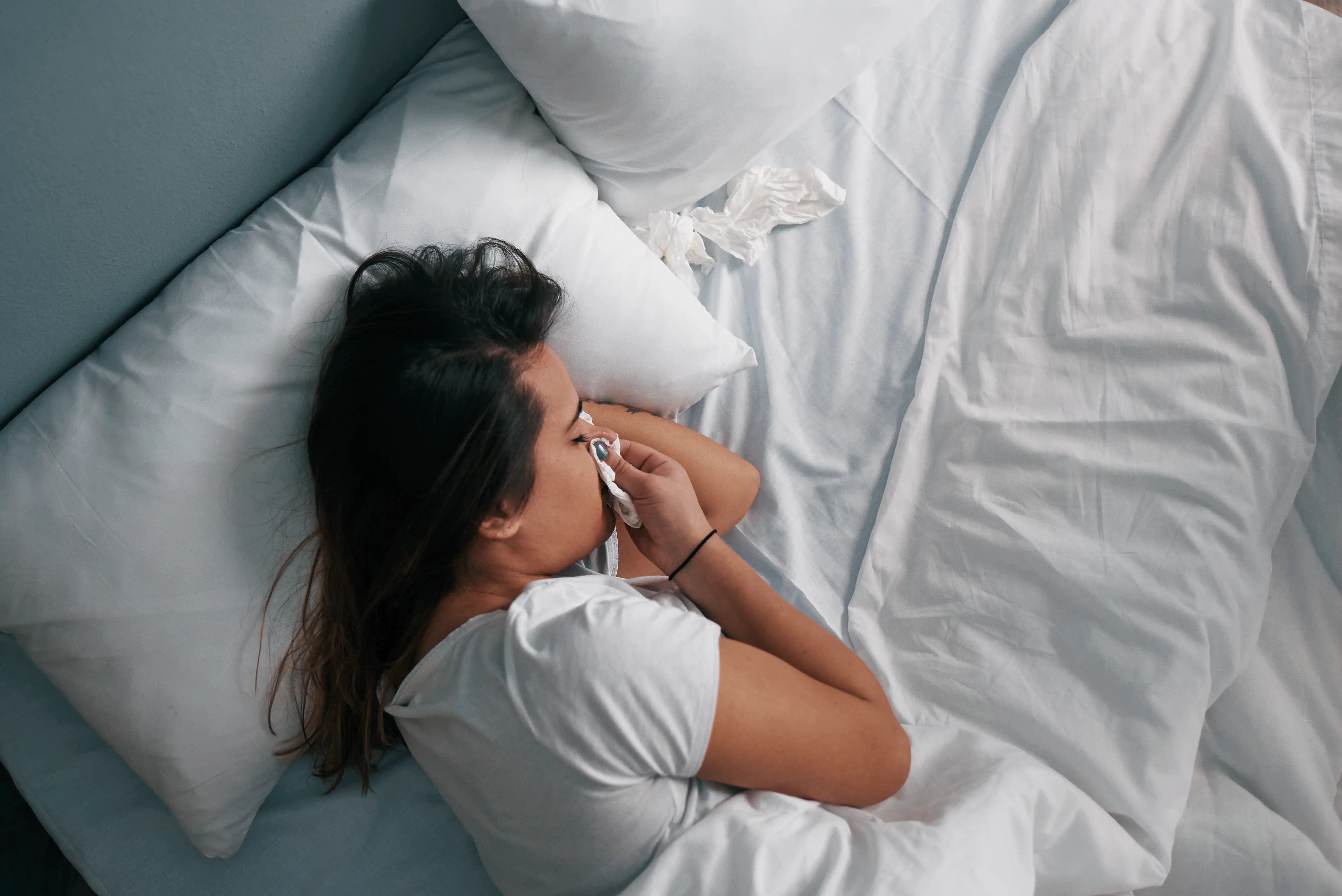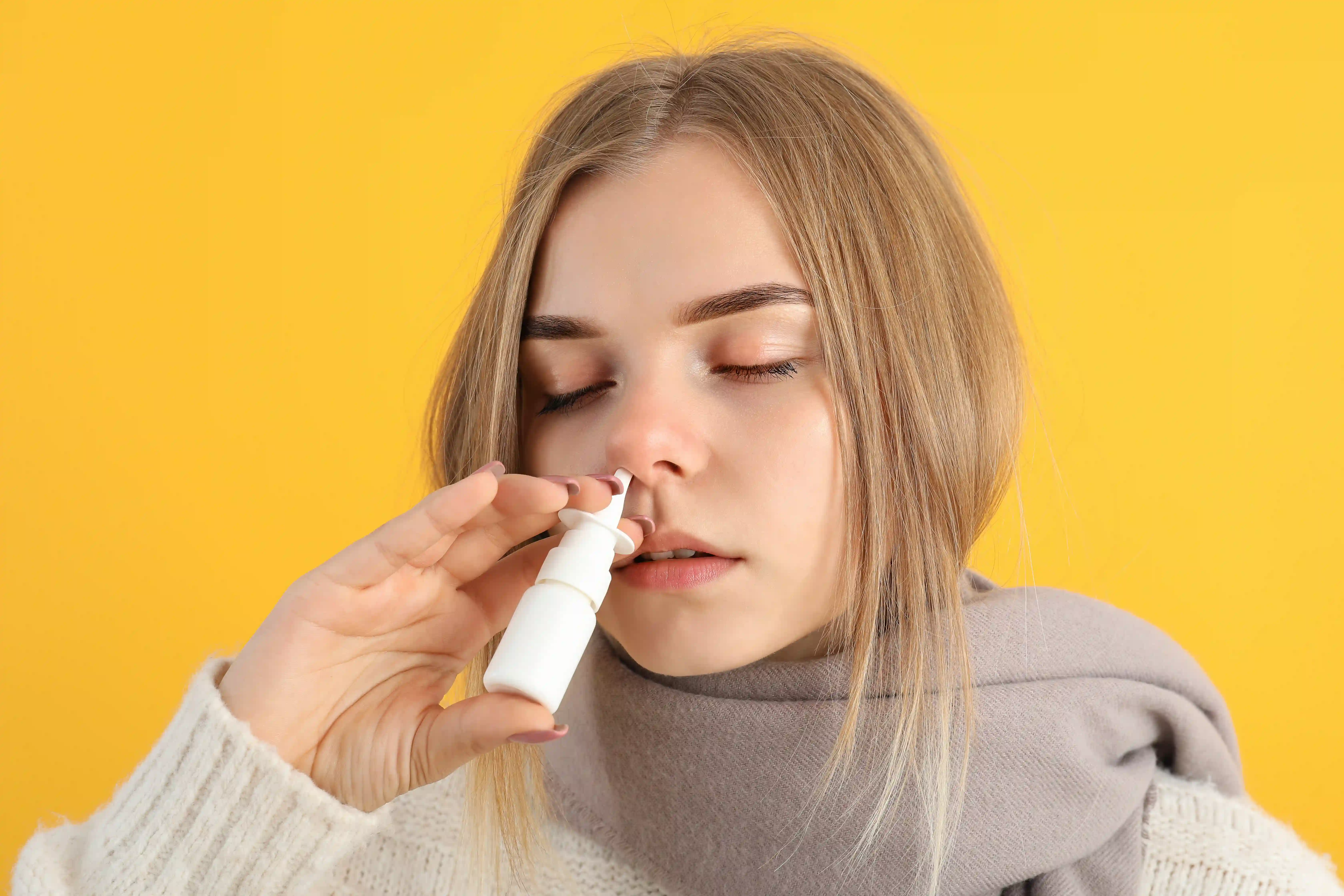Sleep is a fundamental aspect of our health, playing a crucial role in physical and mental well-being. Adequate sleep enhances cognitive function, emotional stability, and overall productivity.
However, sleep disturbances can significantly hinder these benefits, leading to issues such as fatigue and impaired concentration. Common causes of sleep disturbance include stress, lifestyle choices, and physical conditions like a blocked nose, which can disrupt breathing during sleep.
In this article, we will discuss this phenomenon, its causes, symptoms, and effective treatment options to combat its negative impact on sleep and overall well-being.
What is nighttime nasal congestion?

Nighttime nasal congestion is a common condition characterized by the obstruction of nasal passages during sleep. This can result from various factors, including allergies, colds, or sinus infections.
The congestion often leads to difficulty breathing, disrupted sleep patterns, and decreased overall comfort. Individuals may experience a sensation of fullness or pressure in the nasal area.
Common Causes of a Blocked Nose at Night
Understanding the common causes of a blocked nose at night is essential for effective management and relief of nighttime nasal blockage. Implementing appropriate remedies can significantly improve sleep quality and overall well-being.
Allergies and Sinus Issues
Common causes associated with this condition often include nasal congestion, difficulty breathing through the nose, and a feeling of pressure in the sinuses.
Allergies are a frequent culprit, triggering inflammation and excessive mucus production. Additionally, sinus issues may exacerbate these symptoms, leading to discomfort while lying down.
- Seasonal allergies: One of the most common causes of this condition is seasonal allergies, which are often triggered by environmental factors such as pollen from trees, grasses, and weeds during specific times of the year. These allergens can lead to inflammation in the nasal passages, resulting in congestion that makes breathing difficult, especially when lying down.
- Dust Mites, Pollen, and Pet Allergies: Dust mites thrive in bedding, upholstery, and carpets, and their waste products can provoke allergic reactions in sensitive individuals. The presence of pet allergens, particularly from cats and dogs, can also contribute to nasal congestion for those with sensitivities.
- Chronic Sinusitis or Nasal Polyps: Chronic sinusitis can exacerbate these symptoms, resulting in persistent inflammation of the nasal passages. In some cases, the presence of nasal polyps may further obstruct airflow, leading to increased discomfort during nighttime.
Respiratory Infections
Respiratory infections can cause various symptoms, particularly a blocked nose at night. This condition can significantly disrupt sleep patterns, causing discomfort and difficulty breathing.
- Common Cold, Flu, or Viral Infections: These conditions lead to inflammation of the nasal passages, resulting in increased mucus production and congestion. During sleep, this congestion can become more pronounced, making it difficult to breathe comfortably. The body's natural response to these infections includes swelling of the nasal tissues, which can exacerbate symptoms at night.
- Bacterial Sinus Infections: These infections lead to inflammation and swelling of the sinus cavities. As individuals lie down to sleep, gravity can exacerbate the blockage, making it difficult to breathe comfortably.
Structural Issues
A blocked nose at night can be attributed to various structural issues within the nasal passages.
Addressing these underlying causes is essential for effective management of nighttime nasal blockage.
- Deviated Septum: This condition occurs when the cartilage or bone that separates the nasal passages is misaligned, leading to obstruction and difficulty in breathing through the nose.
- Enlarged Adenoids: This condition could occur in children and adults. These lymphatic tissues can block airflow through the nasal passages, particularly when lying down at night.
Lifestyle Factors
A blocked nose at night can be attributed to various lifestyle factors, significantly affecting sleep quality and overall well-being. Addressing these lifestyle factors can significantly improve nasal airflow and overall sleep quality.
- Smoking or Exposure to Smoke: One prominent cause is smoking or exposure to smoke, which irritates the nasal passages and leads to inflammation. The chemicals in cigarette smoke can exacerbate existing nasal congestion, making it difficult for individuals to breathe comfortably while sleeping. Furthermore, secondhand smoke poses similar risks, contributing to chronic respiratory issues and exacerbating allergic reactions that can result in a blocked nose.
- Excessive Alcohol Consumption: Alcohol has a dehydrating effect on the body, which can cause the mucous membranes in the nasal passages to become dry and swollen, leading to increased congestion. Additionally, alcohol can relax the muscles in the throat, which may further restrict airflow during sleep and exacerbate breathing difficulties.
- Overuse of Nasal Sprays: One common cause is the overuse of nasal sprays, which may initially provide relief but can lead to rebound congestion when used excessively. This dependence creates a cycle where individuals feel compelled to use the spray more frequently, ultimately worsening their nasal obstruction.
Symptoms Associated with a Blocked Nose at Night

A blocked nose at night can lead to a range of uncomfortable symptoms that significantly affect sleep quality. Addressing these symptoms is essential for maintaining both physical and mental well-being, highlighting the importance of seeking appropriate treatment for nasal congestion, especially during nighttime hours.
Difficulty Breathing Through the Nose
One of the primary symptoms is difficulty breathing through the nose, which can cause discomfort and disrupt normal breathing patterns during sleep.
This obstruction often results in mouth breathing, leading to dryness and irritation of the throat.
Snoring or Disrupted Sleep
One of the most common consequences is snoring, which can disrupt not only the affected individual's rest but also that of their partner. The inability to breathe freely through the nose often forces individuals to resort to mouth breathing, further exacerbating snoring or disrupted sleep.
Dry Mouth or Sore Throat Upon Waking
When nasal passages are obstructed, individuals often resort to breathing through their mouths, resulting in a lack of moisture that can irritate the throat. This dryness can be exacerbated by sleeping with the mouth open, leading to inflammation and discomfort.
Headaches or Facial Pressure
A blocked nose can also result in headaches or facial pressure. The congestion can create a build-up of sinus pressure, leading to discomfort that may be felt in the forehead, cheeks, or around the eyes. This pain can be exacerbated during the night when lying down, compounding the overall feeling of unrest.
Post-Nasal Drip or Coughing
Individuals may experience post-nasal drip, leading to throat irritation and subsequent coughing. This condition often worsens when lying down, as mucus accumulates, causing discomfort.
Quick Remedies for a Blocked Nose at Night
A blocked nose at night can significantly disrupt sleep, leading to discomfort and fatigue. Fortunately, there are several quick remedies that can help alleviate nasal congestion.
Saline Nasal Spray
This over-the-counter remedy works by moisturizing the nasal passages, thinning out mucus, and promoting drainage. By applying a saline nasal spray before bedtime, individuals may find it easier to breathe, allowing for a more restful night’s sleep.
Steam Inhalation
Inhaling steam helps to open up the nasal passages and reduce inflammation. This can be achieved by taking a hot shower before bed or using a bowl of hot water with a towel draped over the head to trap the steam.
A few minutes of steam inhalation can provide immediate relief from congestion and create a soothing environment conducive to sleep.
Nasal Decongestant Sprays
One effective remedy is to use nasal decongestant sprays, which can provide rapid relief by reducing swelling in the nasal passages. These sprays work by constricting blood vessels, leading to decreased congestion and improved airflow.
However, it is crucial to use them sparingly and not for more than a few consecutive days to avoid rebound congestion.
Keeping Hydrated
Keeping hydrated is essential in managing nasal congestion. Drinking plenty of fluids throughout the day ensures that mucus remains thin and easier to expel.
Herbal teas or warm broths can be particularly effective in promoting hydration while providing additional warmth and comfort during colder nights.
Hot Showers Before Bed
Another practical approach is to take hot showers before bed. Steam from the hot water can help moisten the nasal passages, making it easier to breathe.
Additionally, the warmth of the steam can relax the muscles and promote a sense of comfort, which is conducive to falling asleep.
Long-Term Solutions: How to Reduce Stuffy Nose at Night

There are several long-term solutions to mitigate the negative impact of a blocked nose at night. By implementing these practices, individuals can create a healthier living environment that significantly reduces nighttime nasal congestion
Managing Allergies
Allergies are one of the main causes of nighttime nasal congestion, and to effectively manage allergies, implementing long-term solutions is essential.
- Use Hypoallergenic Pillowcases and Bedding: One practical approach is to use hypoallergenic pillowcases and bedding, which can significantly reduce allergens in your sleeping environment. These specially designed materials are less likely to harbor dust mites, pet dander, and other common irritants that contribute to nasal congestion. By incorporating hypoallergenic fabrics into your bedroom, you create a healthier space that promotes better sleep and minimizes allergy symptoms. Check out our best list for the Best Organic Mattresses.
- Clean Air Filters, Carpets, and Curtains Regularly: One crucial step to manage allergies is to clean air filters regularly, as this helps to maintain optimal air quality by removing allergens and pollutants. Additionally, carpets and curtains can accumulate dust and allergens over time; therefore, cleaning carpets and curtains regularly is essential to minimize their impact on respiratory health.
- Keep Pets out of the Bedroom if Allergic to Pet Dander: Keeping pets out of the bedroom minimizes exposure to allergens, which can significantly improve sleep quality and reduce congestion.
Nasal Irrigation
To address this issue effectively, long-term solutions such as nasal irrigation and using a humidifier can be particularly beneficial. Nasal irrigation, which involves flushing the nasal passages with saline solution, helps to clear out mucus and allergens that contribute to congestion.
This process not only provides immediate relief but also promotes better nasal hygiene over time. By incorporating nasal irrigation into a nightly routine, individuals can experience decreased inflammation and improved airflow, leading to more restful sleep.
Using a Humidifier
A humidifier adds moisture to the air, which can alleviate dryness in the nasal passages and throat. This is especially useful in dry climates or during winter months when indoor heating can lead to decreased humidity levels.
Proper humidity levels help to keep the mucous membranes hydrated, reducing the likelihood of congestion and irritation.
Adjusting Sleeping Position
Sleep position can play a crucial part in reducing nasal congestion at night. Elevating the head while sleeping can help facilitate better drainage of the nasal passages, reducing congestion.
Additionally, sleeping on your side may prevent mucus buildup, which often occurs when lying flat on your back.
Home Remedies to Try Before Sleep
Home remedies can be an effective way to promote relaxation and alleviate common ailments before sleep.
By utilizing these home remedies, you can create a peaceful bedtime ritual that nurtures both body and mind.
Essential Oils for Decongestion
Oils such as eucalyptus or peppermint can be diffused in the bedroom or applied topically (when diluted) to provide relief from congestion, allowing for a more restful night.
Their aromatic properties not only aid in physical comfort but also contribute to mental relaxation, creating a soothing atmosphere conducive to sleep.
Honey and Ginger Tea
Incorporating honey and ginger tea into your evening routine can offer significant health benefits. Honey possesses natural antimicrobial properties, while ginger is known for its anti-inflammatory effects.
A warm cup of honey ginger tea sweetened with honey taken before bed can aid digestion and soothe the throat, making it easier to drift off to sleep. Together, these ingredients provide a comforting end to the day, promoting overall well-being and enhancing sleep quality.
Onion Therapy
This natural remedy involves placing sliced onions in your bedroom or under your pillow to help purify the air and alleviate respiratory issues, which can lead to improved sleep quality.
The strong aroma of onions is believed to have calming effects, potentially reducing stress and anxiety levels before bedtime. Incorporating Onion Therapy into your nightly routine may help create a more conducive environment for restful sleep, allowing you to wake up refreshed and rejuvenated.
When to See a Doctor Regarding Blocked Nose at Night

Experiencing a blocked nose at night can be both uncomfortable and disruptive to sleep. While occasional nasal congestion is common and often resolves on its own, certain symptoms may indicate the need to consult a healthcare professional.
You should see a doctor if you encounter severe facial pain or swelling, as these could indicate a more serious condition, such as a sinus infection or other underlying issues.
If Nasal Congestion Lasts Longer Than 10 Days
If nasal congestion lasts longer than 10 days, it is advisable to consult a healthcare professional. Prolonged nasal blockage can signify underlying issues such as sinusitis or allergies that may require medical intervention.
Severe Facial Pain or Swelling
You should see a doctor if you encounter severe facial pain or swelling, as these could indicate a more serious condition, such as a sinus infection or other underlying issues.
Blood in Nasal Discharge
One critical sign to watch for is the presence of blood in nasal discharge. This could suggest an underlying issue, such as a nasal injury, infection, or even more serious conditions that require medical evaluation.
Symptoms of Sleep Apnea
If you notice other symptoms of sleep apnea, such as loud snoring, gasping for air during sleep, or excessive daytime fatigue, it is essential to seek medical advice. Sleep apnea can significantly affect overall health and well-being, and its relationship with nasal congestion should not be overlooked.
FAQs
Is using the nasal spray every night harmful?
Prolonged use of certain nasal sprays, especially those containing decongestants, may result in a condition known as rhinitis medicamentosa, where the nasal passages become reliant on the medication, leading to congestion when the spray is not used.
Is a blocked nose at night a sign of sleep apnea?
Nasal congestion at night can indeed be a symptom of sleep apnea. When nasal passages are blocked, it can exacerbate breathing difficulties, leading to increased risks of apnea events.
What is the fastest way to relieve a blocked nose at night?
To quickly relieve this discomfort, consider using a humidifier in your bedroom; the added moisture can help thin mucus and promote easier breathing. Additionally, elevating your head with extra pillows may facilitate nasal drainage.
Can stress or anxiety cause a blocked nose at night?
Stress and anxiety can contribute to a blocked nose at night. When individuals experience heightened stress levels, the body's fight-or-flight response is activated, leading to the release of stress hormones. Additionally, anxiety may lead to increased muscle tension, which can further exacerbate nasal blockage.
Conclusion
A blocked nose at night can significantly disrupt sleep quality and overall well-being. Various treatment options are available to alleviate this condition, including nasal decongestants, saline sprays, and humidifiers.
Additionally, elevating the head while sleeping may help reduce congestion and improve airflow. It is essential to identify the underlying cause of nasal blockage, such as allergies or sinus infections, for effective treatment.
Addressing a blocked nose at night requires a multi-faceted approach that combines immediate relief with long-term management strategies to enhance nightly comfort and health.
Jessica H.
Jessica is a reviewer, writer, and sleep enthusiast at Sleepiverse. Jessica graduated with her master's degree in Nursing research and education. She is a registered nurse and currently works in the Intensive Care Unit. Since becoming a nurse, Jessica has worked the night shift, which means a disrupted sleep schedule. Knowing she needed to function at her best while caring for patients at night, she spent a lot of time researching how to sleep well with a difficult schedule.


